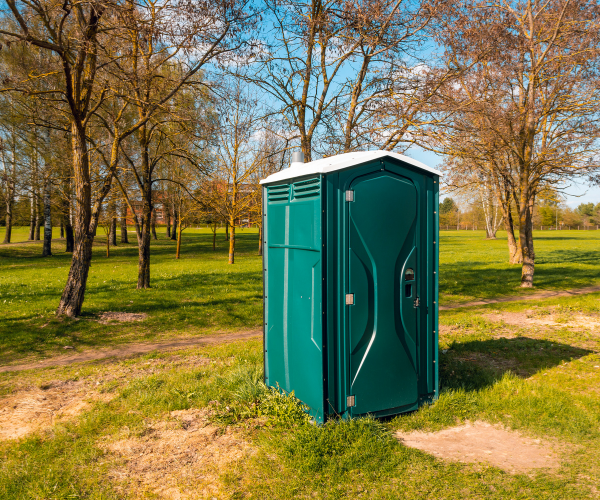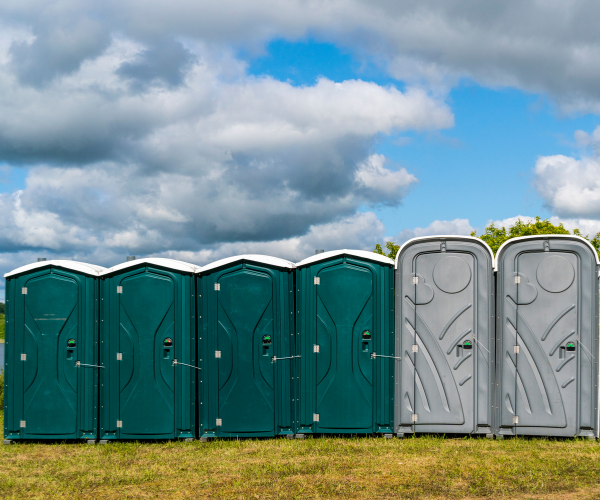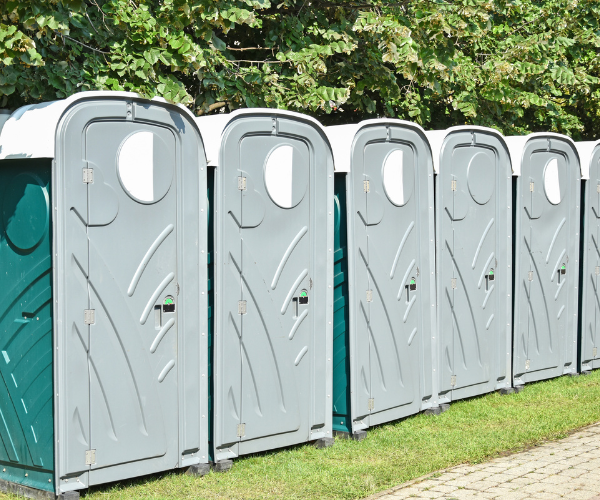Portable toilets provide a range of eco-friendly benefits that positively impact the environment and sustainable practices. Essential to this is water conservation: compared to traditional flush toilets, portable units significantly reduce water usage, as they require no plumbing connections and function independently. This contributes to water savings, especially in areas where water scarcity is a concern.Furthermore, portable toilets are designed to manage waste effectively. Modern units incorporate advanced waste treatment processes, ensuring that human waste is safely contained, treated, and disposed of in compliance with environmental regulations. This limits the risk of contamination to the surrounding areas, protecting both soil and water resources.In addition to effective waste management, the materials used in portable toilets are often chosen for their durability and recyclability. Many manufacturers prioritize using recycled and sustainable materials in constructing toilet units, which not only extends the lifecycle of the product but also reduces the overall carbon footprint associated with production and disposal.Moreover, portable toilets reduce emissions associated with construction and plumbing work. When large events or outdoor gatherings choose portable toilets over building permanent facilities, the demand for materials, transport, and labor reduces significantly. This leads to decreased fossil fuel consumption and a smaller carbon footprint.Finally, portable toilets provide versatility and ease of installation in diverse environments, from urban festivals to rural construction sites. This adaptability ensures that sanitation needs are met quickly and efficiently, reducing the environmental impact that setting up traditional infrastructure would entail. Overall, integrating portable toilets into sanitation strategies is an effective way of supporting sustainability while maintaining hygiene and comfort.

Portable Toilet Rentals in High Springs, Florida
Call today for a free quote (352) 660-8775
Portable Toilet
Fast, Easy, & 100% Free To Get Started
Over 20 Years Of Experience
For more than 20 years, our portable toilet company has delivered top-quality service in High Springs, emphasizing customer satisfaction. Our strong local ties guarantee reliable support for all your requirements.
Unmatched Quality Service
We deliver clean, comfortable portable toilets that reflect our unwavering commitment to quality, elevating your event experience. Expect service that consistently exceeds your expectations.
Guaranteed Quick Delivery
We take pride in our efficient delivery system, ensuring portable toilets are set up promptly without compromising quality. Rely on us for rapid response times that keep your events running smoothly.
Convenient Portable Toilet Solutions in High Springs
Call for a Free Quote Today
(352) 660-8775
Located in the heart of High Springs, our portable toilet company is committed to providing dependable and reliable services for all your needs. As a locally owned business, we pride ourselves on delivering the highest level of service to our community and surrounding areas such as Alachua and Fort White. From large construction sites to intimate weddings, grand festivals, and backyard parties, our team of professionals ensures that each unit is meticulously maintained for cleanliness and functionality. Our reputation for quality underscores our commitment to enhancing your events with comfort and convenience. Whether you're organizing a small gathering or a major event, trust us to provide superior portable sanitation solutions tailored to the occasion. Our dedication to customer satisfaction sets us apart, making us the preferred choice for portable restroom services.


Standard Portable ToiletOur standard porta john rental units are durable and reliable for any commercial build site, housing development, public works project, or remodel job.Features include dome lighting, grated floors, and an “In-Use” locking mechanism for privacy and comfort.Regularly maintained, inspected, and cleaned by FusionSite at your location.

Wheelchair Accessible RestroomsDeveloped as an alternative to full ADA-compliant restrooms, the Liberty is a spacious, wheelchair-accessible unit that can also be promoted as a family-sized restroom.Includes a patented flat-floor system for easy wheelchair access and maneuverability.Handrails, paper holder, and rotary latch are designed for simple, intuitive end-user operation.

Portable SinkPortable hand washing stations are essential for keeping your work site sanitary and clean.Features hands-free foot pumps, liquid soap, and paper towels.Perfect for job sites without water hookups, these units can handle hundreds of washes between services.
We Proudly Serve
Standard Portable Toilets
Our Standard Portable Toilets at Porta Serve in Florida provide reliable and sanitary restroom solutions for events and constructions.
High Rise Portable Toilets
High Rise Portable Toilets in Florida, High Springs ensure top-notch sanitation for elevated events and construction projects.
Restroom Trailers
Our Restroom Trailers at Porta Serve in High Springs offer a luxurious and spacious alternative for high-capacity events.
Roll off Dumpsters
Porta Serve's Roll Off Dumpsters in High Springs offer efficient waste management for clean and organized project sites.
Septic Tank Cleaning
Choose Porta Serve in Florida for Septic Tank Cleaning, ensuring effective waste removal and system maintenance.
Grease Trap Cleaning
Porta Serve offers professional Grease Trap Cleaning in High Springs, Florida, ensuring compliance and functionality.
Fencing & Barricades
Porta Serve in Florida provides robust Fencing & Barricades solutions for secure and organized event management.
Residential Storage
Our Residential Storage in High Springs, Florida, offers secure and convenient storage solutions for various needs.
High Springs Portable Toilet and Event Services
Acquiring a quote and arranging delivery for portable toilets has never been easier or more convenient. Our streamlined process ensures that you can obtain the information you need swiftly. Simply visit our website and fill out our user-friendly form by providing your first name, last name, phone number, and email. Our intuitive design guarantees that the quote process is not only straightforward but also efficient, enabling you to focus on the more complex aspects of your event planning. A dedicated team is on standby, ready to handle your inquiries swiftly, ensuring that your quote request does not encounter unnecessary delays. Upon receiving your request, our team actively works to provide a detailed breakdown of potential costs and timelines, all formulated to reflect your unique needs. Whether you're preparing for a bustling corporate event or a serene outdoor wedding, our approach ensures that all quotes are tailored to accommodate the precise number of portable toilets you require, their specifications, and the duration of the rental period. Additionally, the delivery process reflects our commitment to punctuality and relies on advanced logistics to ensure that your portable toilets arrive on time, every time. The stages from quote to delivery are designed to minimize disruptions, allowing you to focus wholeheartedly on orchestrating a memorable event.

High Springs is renowned for its stunning natural settings and vibrant community events, making it the perfect location for utilizing our portable toilet services. Our comprehensive range of facilities ensures that whether you're hosting a large festival or an intimate gathering, your guests enjoy clean and convenient sanitation options. Situated near the majestic Ginnie Springs and the scenic trails of the Santa Fe River, our portable toilets offer the ideal solution for maintaining hygiene without interrupting the area's breathtaking beauty. Community events in High Springs thrive on local participation and goodwill, further enhanced by the reliability of our portable sanitary solutions. We cater to sports events, town fairs, and more, ensuring that every occasion runs smoothly. Our units are not only meticulously maintained but also strategically placed, allowing for swift access that contributes to a positive guest experience. Our service's ability to blend with the charming ambiance of High Springs highlights our role as the top choice for portable toilets in the region. Dependable and eco-friendly, our products are designed with both the needs of local residents and the expectations of visitors in mind, ensuring a seamless experience on every visit.
When it comes to portable toilet services in High Springs, our company stands out as the premier choice for both quality and convenience. Our extensive expertise and dedication to fulfilling the unique needs of each client make us the go-to option for seamless service delivery. From routine maintenance to easily accessible features, our portable toilets are equipped to handle any demand while maintaining a high standard of cleanliness and reliability.The charm of High Springs is reflected in our commitment to the community and its events, further emphasizing our services' local appeal. With our solutions, event organizers can concentrate on fostering community spirit, confident that sanitation is managed by a trusted local provider. Choose us for portable toilet services that align with High Springs' dedication to hospitality and high-quality service.
Efficiency and reliability are at the forefront of our portable toilet services, ensuring that High Springs residents and businesses receive the best possible support. With quick turnaround times and a service model designed to eliminate delays, our focus is on ensuring all needs are met with precision and timeliness. Whether for a public event or a private gathering, our services guarantee a stress-free experience through prompt, effective delivery and setup.Our team's expertise ensures that the entire process, from initial contact to final setup, is handled with professionalism and care. By leveraging top-of-the-line logistics systems, we can coordinate timely deliveries throughout High Springs, making sure all portable toilets are in excellent condition, ready whenever needed for any occasion.You can trust that our commitment to excellence extends beyond punctual services to include robust customer support and expertise, providing you with assurance and prompt assistance whenever required.
Learn More About Our Portable Toilets in High Springs
Renting a portable toilet in High Springs is a straightforward process designed with convenience and clarity in mind. Start by visiting our website, where you'll find Get A Quote buttons prominently displayed at the top and bottom of our pages. Clicking one of these buttons will lead you to our simple quote form, where you are prompted to fill in essential details like your first name, last name, phone number, and email address.Submitting this form sends your information directly to our attentive customer service team, who are ready to respond promptly. They will arrange to call or email you with a detailed quote, tailored to your particular event or project requirements. The quote not only includes pricing but also provides comprehensive information about delivery times, types of toilets available, and any additional services offered.Our rapid quote system ensures you get the answers and estimates you need without unnecessary delays, allowing you to proceed with your planning as efficiently as possible. Once you have reviewed and approved your quote, our team will handle all the arrangements for delivery, ensuring that your portable toilets arrive precisely when and where you need them.This seamless process is underpinned by our commitment to excellent customer service and reliability. Whether renting for a day or a week, the process revolves around ease of use and satisfaction, making sure you spend less time on logistics and more time focusing on your event or project.
Understanding the delivery timeframe for portable toilet orders is crucial for effective event planning and project execution. We prioritize timeliness and flexibility, ensuring that our deliveries align precisely with your schedule requirements. Typically, orders placed well in advance are scheduled to arrive a day prior to ensure setup and placement without any rush. Last-minute orders are not uncommon for us, and we have systems in place to fulfill them efficiently, coordinating with our logistics team to prioritize urgent requests and meet tight schedules.Delivery times may vary based on the scale of the order and location specifics, but our standard delivery window operates during business hours for maximum convenience. We find that confirming delivery details in advance facilitates seamless coordination, especially for early morning setups which we are fully equipped to manage.Our goal is to eliminate any stress associated with the delivery, allowing clients to remain focused on other important planning aspects. Each delivery is carried out by experienced professionals trained to position the units correctly and in compliance with all safety regulations. Additionally, our team is happy to accommodate specific delivery instructions, ensuring each portable toilet is both accessible and strategically placed.While our approach is typically straightforward, exceptions can arise from factors like regional traffic or unusual weather, in which case you'll be promptly informed and updated with new projected timings. Our commitment to punctuality and transparency ensures that even when adjustments are necessary, you remain well-informed, minimizing any potential disruption to your plans.
Yes, we are thoroughly equipped to service a wide array of events and construction services, meeting all your portable toilet needs with unmatched quality and convenience. Whether you're organizing a vibrant festival, a dynamic sporting event, or the elegance of a wedding, our diverse range of solutions provides the perfect match for any occasion. Beyond public gatherings, we cater to corporate functions, family reunions, and special private events, offering luxury restroom trailers that elevate the experience for your guests.Our options include not only traditional porta potties but also roll-off dumpsters, fencing and barricades, holding tanks, ADA-compliant units, portable sinks, and hand sanitizer stations to address every aspect of sanitation. Each product is purposefully selected and maintained for its effectiveness and ease of use.For construction services, we provide the necessary infrastructure to ensure worker accessibility and compliance with safety regulations, thus contributing positively to project efficiency. Regardless of the type of event or service, our focus remains on delivering products that align seamlessly with your operational or celebratory needs.Committed to customer satisfaction, our experienced team is ready to provide guidance and support to help you select the best options for your event size, location, and scope. Our comprehensive offerings confirm our position as a reliable partner for all your portable restroom requirements.

